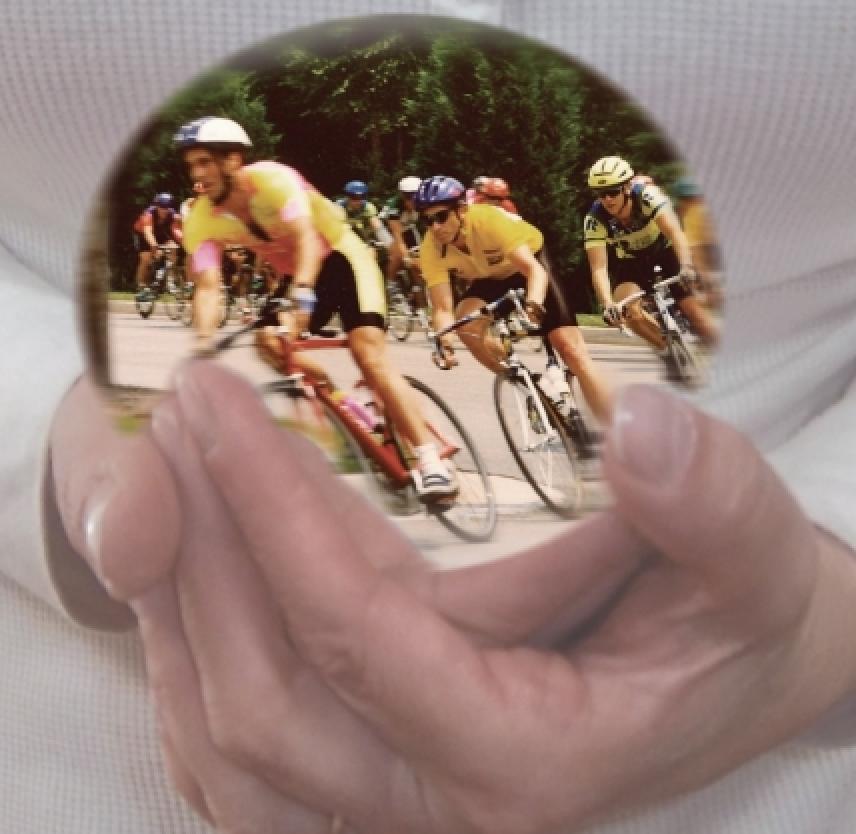
A good deal of a caregiver’s pain could be alleviated if he or she could see the situation as an outsider and be at peace with the facts of the incident that caused a loved one’s injury.
In the midst of crisis, between panic and hysteria, thoughts creep in. How did this happen? What could I have done? These questions form the beginning of a long line of self-recriminating thoughts that haunt many caregivers I have spoken to in recent years.
After a car hit my husband while he rode his bike home from a workout, I wondered, “Why didn’t I insist that Hugh stop riding his bike after he had back surgery?” It was always in the corner of my mind that he’d fall off his bike and ruin his spine someday.
He didn’t. He hurt his brain, a far worse scenario.
The truth is that I did ask him to stop riding a time or two after his back surgery, but he convinced me that cycling was part of his identity. He argued that cycling provided a great deal of fitness, enjoyment, and socialization for him, and I agreed. It’s always been part of what drew me to him — his athleticism and tenacity — the same traits that helped him heal after his traumatic brain injury.
What I didn’t see in the days and months after Hugh’s accident was this: I didn’t cause his bike accident, and there was nothing I could do to stop it except for rearranging the timing of that day, maybe insisting on a kiss good-bye as I washed dishes at the sink before he left. Those few moments might have made a difference. I relived that day for weeks and months after the accident until I finally let it go. It happened. It was over. I couldn’t stop it, just like I couldn’t stop the endless pain that we were going through.
For those of us who wish one moment in time never happened or could have been altered, a constant vibrant illusion of what might have been takes over. Doubt seeps in, clouding the mind. Am I making competent decisions? Am I making this decision for the right reason? Can I believe in myself again?
One caregiver confided in me that she felt guilty for being asleep when her loved one was injured. Another said she didn’t set events in motion that might have prevented the injury her loved one suffered. Some knew that their loved one lived on the edge but couldn’t stop the event that threw that person over the edge. “I wish I had … I wish I knew … I wish I could have changed …” Why didn’t I?
None of us can predict the future, and each of us bears responsibility for our own choices, our own actions, and the consequences that follow. As caregivers, we will do better if we make wise choices for ourselves, for our own physical and mental health. Guilt, blame, and ruminating about what might have been keep us mired in the past, and magical thinking cannot change our circumstances.
What can change our circumstance is how we choose to think, act, and be today.
Forgive yourself. You are human, and humans make mistakes, miscalculations, and sometimes don’t use good judgment. Most of us do the best we can with what we have to work with on any given day.
I finally forgave myself when I admitted to myself that I wanted Hugh to keep cycling because it was an integral part of who he was, and I loved him for who he was, and still do. Even after suffering a TBI, he rides his bike today — a decision that was not easily reached. After months of counseling, I let go of my fear of what might happen, and decided to love the man I love for all that he is, does, and wants, and not because he’ll always bend to please me.
We are individuals with different needs. We can’t always protect each other, but we can be there for each other; and that, to me, is most important of all.

Comments (4)
Please remember, we are not able to give medical or legal advice. If you have medical concerns, please consult your doctor. All posted comments are the views and opinions of the poster only.
Anonymous replied on Permalink
My mom has been my caregiver for 16yrs & found MUCH Comfort in your posting...ThankYOU
LisAnne
Anonymous replied on Permalink
Rosemary,
Human nature to believe one is infallible...not the case, we are God, in human form, therefore we succumb to earthly pulls and tugs.The speed of life today is obscene, to put it mildly...to fail is human, to regret is human, to rise above and see what is light, what is dark, and what is meant to be beyond human comprehension is life. Your life, my life, your husband's life. Acceptance is a tough nut to crack at times. Understand everything has its time...patience, patience, patience. Everything has an answer that will jell with the mind, in time, always in time. The key to unlock the encrypted code is within an it comes forth in time, once again!!!
Art C.
Anonymous replied on Permalink
I totally agree with you! I know from the number of caregivers that tell me they have secondary stress or PTSD that it's a real problem. Thank you for your comment, Rosemary
Anonymous replied on Permalink
Love this! Thanks for talking about "ruminating over events" - I believe that is a symptom or coping mechanism of PTSD. I guarantee that most caregivers suffer from undiagnosed/untreated PTSD, at the same or higher rates as survivors. That could be an interesting study.